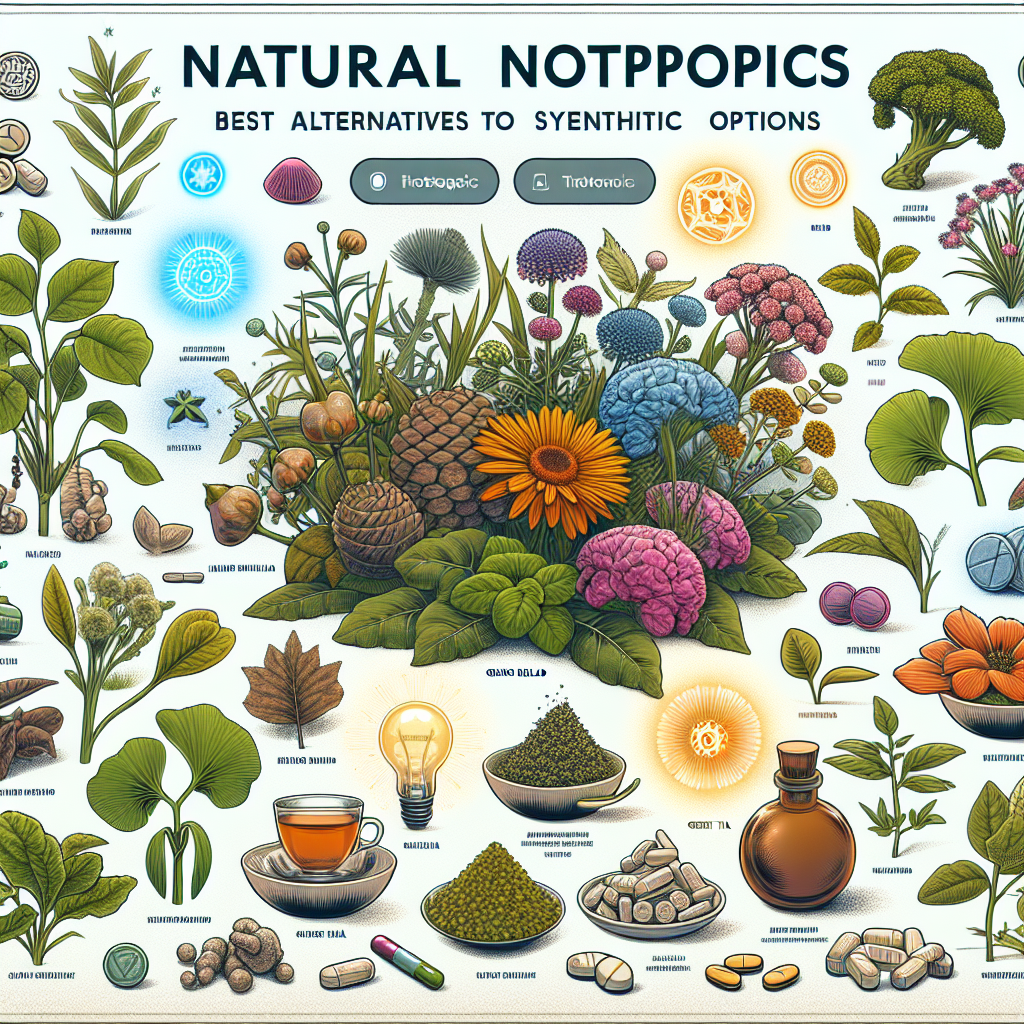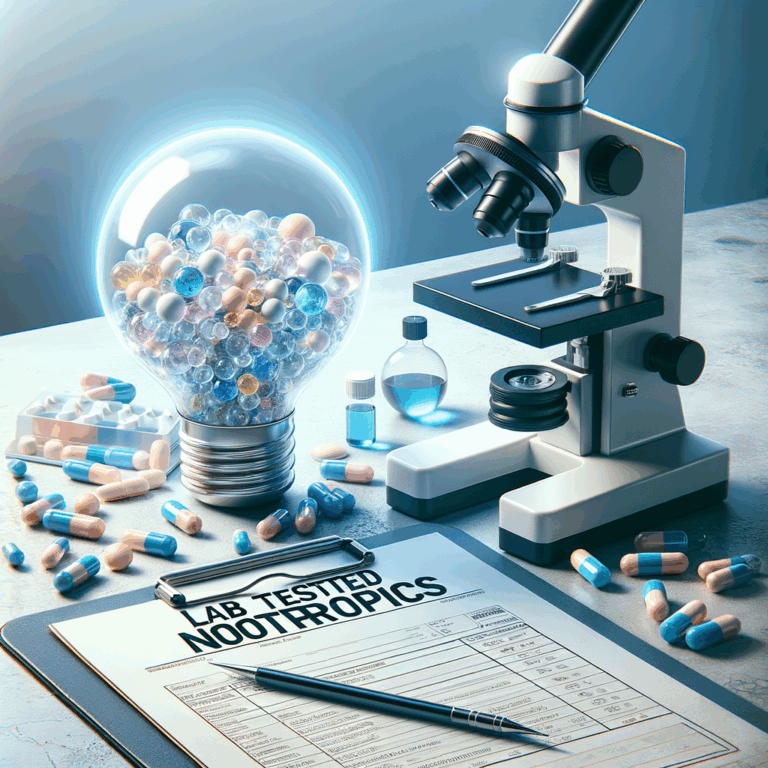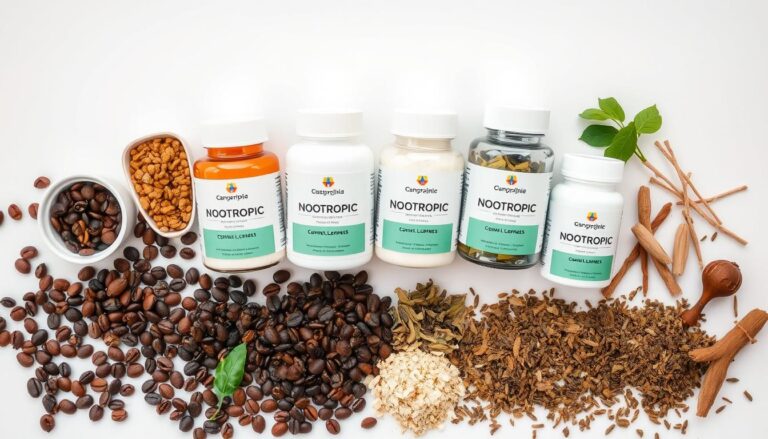
- Understanding Nootropics: The Basics
- Synthetic Nootropics: Pros and Cons
- The Rise of Natural Nootropics
- Benefits of Natural Nootropics
- 1. Improved Focus and Concentration
- 2. Enhanced Memory
- 3. Reduced Anxiety and Stress
- 4. Increased Energy Levels
- 5. Overall Brain Health
- Comparing Natural Nootropics with Synthetic Nootropics
- Top Natural Nootropics to Consider
- Ginkgo Biloba
- Bacopa Monnieri
- Ashwagandha
- Rhodiola Rosea
- Lion’s Mane Mushroom
- L-Theanine
- Gotu Kola
- Panax Ginseng
- Omega-3 Fatty Acids
- Mucuna Pruriens
- Tips for Choosing Natural Nootropics
- Quality Matters
- Start Small
- Research Before You Buy
- Consult a Professional
- Monitor Your Progress
- Potential Risks and Side Effects
- The Future of Nootropics
- Conclusion
- Frequently Asked Questions
- References
Understanding Nootropics: The Basics
Nootropics have surged in popularity over the last few years. More people are becoming interested in enhancing their cognitive abilities, mood, and overall brain health. Nootropics are often categorized into two main groups: natural and synthetic. While synthetic nootropics promise quick results, they can come with a host of potential side effects. This is where natural nootropics step in as appealing alternatives.
Natural nootropics offer various cognitive benefits without the risks associated with synthetic options. They harness the power of nature to improve brain function while promising fewer adverse effects. In this comprehensive guide, we will explore what natural nootropics are, dissect their benefits, compare them to synthetic nootropics, and highlight some of the best natural options available.
Synthetic Nootropics: Pros and Cons
Synthetic nootropics aim to enhance cognitive function using man-made compounds. These drugs have gained traction, especially in academic and professional environments where high performance is crucial. However, many individuals overlook the potentially harmful consequences of using these products.
On the positive side, synthetic nootropics often yield immediate results. Users may experience improved focus, enhanced memory, and increased motivation. However, the flip side includes side effects such as anxiety, insomnia, or, in severe cases, dependency. For some, the risks far outweigh the benefits, prompting a growing interest in natural alternatives.
The Rise of Natural Nootropics
Natural nootropics have been celebrated for centuries in traditional medicine. These substances include herbs, plants, and other natural compounds known to positively impact brain health. The rising awareness of mental health, wellness, and holistic approaches has led many to explore these natural options.
Many people are keen to avoid synthetic substances due to the associated side effects. They seek out nootropics that provide mental clarity without compromising their well-being. Consequently, natural nootropics offer a safer, often more sustainable path to boost cognitive abilities.
Benefits of Natural Nootropics
Natural nootropics come with a range of benefits that can enhance your daily life significantly. Here are some of the key advantages:
1. Improved Focus and Concentration
Natural nootropics help sharpen your focus and boost your concentration. For instance, ginkgo biloba can support blood flow to the brain, improving overall cognitive function. Users often report being able to concentrate better on tasks at hand.
2. Enhanced Memory
Several natural nootropics are known for their memory-boosting effects. Bacopa monnieri, for example, has been proven to improve memory retention and recall. Many love how it helps them remember information for exams or professional presentations.
3. Reduced Anxiety and Stress
Natural nootropics like ashwagandha help manage anxiety and stress. Instead of feeling overwhelmed, individuals can enjoy a calm and composed mindset. This leads to enhanced productivity and better decision-making.
4. Increased Energy Levels
The right natural nootropics can also elevate your energy levels. Rhodiola rosea, for instance, combats fatigue while boosting mental clarity. Increased energy results in higher motivation to tackle daily challenges.
5. Overall Brain Health
Natural nootropics frequently come packed with antioxidants that protect brain cells. Protecting your brain from oxidative stress may reduce the risk of cognitive decline. These natural alternatives promote long-term brain health.
Comparing Natural Nootropics with Synthetic Nootropics
When evaluating nootropics, many wonder how natural options stack up against synthetic ones. Each type has its set of unique attributes that may appeal differently to users.
| Feature | Natural Nootropics | Synthetic Nootropics |
|————————–|——————————————————–|————————————-|
| Origins | Plants, herbs, and natural compounds | Man-made chemical substances |
| Side Effects | Generally mild or minimal | Potential for severe side effects |
| Long-Term Health | Supports overall well-being | May cause long-term health issues |
| Cost | Usually more affordable | Often expensive |
| Research | Backed by traditional use, ongoing studies | Mainly based on clinical trials |
Natural nootropics typically offer an advantage in terms of long-term health and minimal side effects. Meanwhile, synthetic options may provide immediate benefits, but those come with potential risks. Ultimately, the choice depends on individual preferences and lifestyles.
Top Natural Nootropics to Consider
As we explore natural nootropics, several standout options have gained strong reputations. Each has its unique properties and benefits. Here are some of the best natural nootropics to consider:
Ginkgo Biloba
Ginkgo biloba is one of the oldest known medicinal plants. It can improve blood flow to the brain, enhancing cognitive functions. Many users find it helpful for memory and mental clarity.
Bacopa Monnieri
Bacopa monnieri has a long history in traditional Ayurvedic medicine. Research reveals that it improves memory recall and reduces anxiety levels. It’s especially useful for those studying or working in high-pressure environments.
Ashwagandha
Ashwagandha is cherished for its adaptogenic properties. It helps manage stress and reduce anxiety, while also promoting mental clarity. Many athletes use it to improve focus during training.
Rhodiola Rosea
Rhodiola rosea is known as a powerful adaptogen. It combats fatigue and improves mental performance during stressful situations. Many find it beneficial for maintaining energy throughout the day.
Lion’s Mane Mushroom
Lion’s Mane mushroom supports the growth of nerve cells. It’s not only a delicious culinary ingredient but also a powerful nootropic. Those who take Lion’s Mane often report better focus and cognitive performance.
L-Theanine
L-theanine is an amino acid found in green tea. It promotes relaxation without causing drowsiness. Many users blend L-theanine with caffeine for a balanced boost of energy and focus.
Gotu Kola
Gotu kola enhances cognitive function and is revered in traditional medicine. It’s known for its calming effects and is often used to reduce anxiety while improving memory.
Panax Ginseng
Panax ginseng is often utilized for its energizing properties. It can improve cognitive function and overall brain health. Many take it to enhance performance and boost endurance.
Omega-3 Fatty Acids
Omega-3 fatty acids, often derived from fish oil, promote brain health. They support memory and may protect against cognitive decline. A diet rich in omega-3s can have lasting benefits for brain function.
Mucuna Pruriens
Mucuna pruriens contains L-DOPA, a precursor to dopamine. This can elevate mood and improve cognitive function. Those seeking a natural way to enhance focus often find it beneficial.
Tips for Choosing Natural Nootropics
When selecting natural nootropics, keep the following considerations in mind:
Quality Matters
Always opt for high-quality products. Check for third-party testing and certifications. This ensures you receive pure and effective supplements.
Start Small
Begin with one nootropic at a time. Testing various combinations may lead to unwanted side effects. Starting with one helps you gauge the effects more effectively.
Research Before You Buy
Look into the nootropic’s effects and proven benefits. Understanding the science behind it enables you to choose the right product for your needs.
Consult a Professional
If you have health conditions or take medications, consult a healthcare provider. They can guide you on safe and effective options that won’t interfere with your medical history.
Monitor Your Progress
Keep a journal to track your experience. Note any changes in mood, focus, or energy levels. This information will guide your future choices.
Potential Risks and Side Effects
Even natural nootropics can pose risks for various individuals. While many are generally safe, it’s vital to consider potential side effects. Some people might experience:
– Digestive upset
– Sleeplessness or drowsiness
– Allergic reactions
Start with lower dosages to see how your body responds. Pay attention to any negative effects and discontinue use if necessary. Prioritizing your health is essential when venturing into nootropics.
The Future of Nootropics
The nootropics market is rapidly evolving. More people are becoming aware of the cognitive benefits associated with various compounds. The emphasis on natural alternatives is prompting researchers to study and validate the effectiveness of multiple natural nootropics.
As society continues to prioritize mental well-being, the popularity of natural nootropics is expected to grow. This movement supports both the body and mind, leading to better overall health. We can anticipate new discoveries and formulations in the coming years.
Conclusion
Natural nootropics offer an exciting landscape of brain-boosting options that appeal to many individuals. Whether enhancing memory, focus, or overall cognitive function, these alternatives provide a healthier route than many synthetic nootropics. By understanding their benefits and potential risks, you can make informed decisions about your cognitive health.
Frequently Asked Questions
1. What are nootropics?
Nootropics are compounds that enhance cognitive function, including memory, focus, and creativity.
2. Are natural nootropics safe?
Generally, natural nootropics are considered safe for most people. However, it’s crucial to check for potential allergies and side effects.
3. How do natural nootropics compare to synthetic options?
Natural nootropics typically have fewer side effects and promote overall health, while synthetic options may offer faster results but come with more risks.
4. Can children take natural nootropics?
It’s essential to consult a healthcare provider before giving any supplements to children, as their needs differ significantly from adults.
5. How long does it take to notice the effects of natural nootropics?
Effects can vary by individual and the specific nootropic. Many users report noticeable benefits within a few weeks.
6. Is there a recommended dosage for natural nootropics?
Dosage varies based on the specific nootropic and individual needs. Always follow product instructions or consult a healthcare professional.
7. Where can I buy high-quality natural nootropics?
Look for reputable health stores, online retailers, or consult with a healthcare provider to find trustworthy sources.
8. Do I need a prescription for natural nootropics?
Most natural nootropics do not require a prescription, but it’s a good idea to consult a healthcare provider beforehand.
9. Can I combine different natural nootropics?
Combining nootropics can be beneficial but should be approached cautiously. Research each combination thoroughly and start with lower dosages.
10. Are there any dietary sources of nootropics?
Yes, many foods contain natural nootropic compounds. Foods rich in omega-3s, antioxidants, and specific herbs offer cognitive benefits.
References
– Healthline: Natural Nootropics
– Verywell Mind: Cognitive Enhancements
– Psychology Today: Nootropics and Their Effects
– Examine.com: Nootropics Overview



